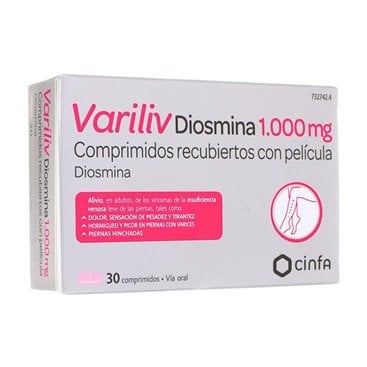Variliv Diosmina 1000 Mg 30 Coated Tablets
Variliv Diosmina 1000 Mg 30 Coated Tablets is a venotonic medicine, which means that it works by increasing the tone of the veins and strengthening the capillaries, which are the small blood vessels. This medicine is indicated for the relief of symptoms related to mild venous insufficiency of the lower extremities in adults.
Variliv Diosmina 1000 Mg 30 Coated Tablets is a venotonic medicine, which means that it works by increasing the tone of the veins and strengthening the capillaries, which are the small blood vessels. This medicine is indicated for the relief of symptoms related to mild venous insufficiency of the lower extremities in adults.
Variliv Diosmina (1000 Mg 30 Coated Tablets)
ACTION AND MECHANISM
- Diosmin produces vasoconstriction, while increasing capillary resistance and decreasing its permeability. Due to these effects, it reduces venous emptying time and peripheral edema, improving the symptoms associated with venous insufficiency.
PHARMACOKINETICS
Linear pharmacokinetics.
- Absorption: after its administration, diosmin is rapidly transformed in the intestine by the intestinal flora and is absorbed in its aglycone form, diosmetin. Oral bioavailability is approximately 57.9%.
- Distribution: extensive in tissues. Vd 62.1 l.
- Metabolism: Diosmetin is rapidly and extensively degraded to phlebotonic acids or their glycine-conjugated derivatives, which are eliminated in the urine. The predominant metabolite in man is hydroxyphenylpropionic acid, which is mostly eliminated in its conjugated form. Metabolites found in minor amounts include other phenolic acids corresponding to 1-hydroxy-4-methoxybenzoic acid, 3-methoxy-4-hydroxyphenylacetic acid, and 3,4-dihydroxybenzoic acid.
- Elimination: in urine (86%) and feces (14%), recovering 34% in 24 hours.
INDICATIONS
- Short-term relief of symptoms related to mild [VENOUS INSUFFICIENCY] in adults.
POSOLOGY
- Adults: 1000 mg daily, preferably in the morning.
- Children and adolescents < 18 years: safety and efficacy have not been established.
Duration of treatment: If the patient does not improve or worsens in the first 2 weeks of treatment, the clinical situation should be evaluated. If necessary, treatment can be continued with the same daily dose for up to 2-3 months.
Forgotten dose: administer the missed dose as soon as possible. Administer the next dose at the usual time. Do not double the next dose.
RULES FOR CORRECT ADMINISTRATION
Swallow the tablets with water.
Administration with food: can be taken with or without food.
CONTRAINDICATIONS
- Hypersensitivity to diosmin or any other component of the drug.
ADVICE TO THE PATIENT
- Do not use this medicine for long periods of time without your doctor's recommendation.
- If you forget a dose, take it as soon as possible, unless there is a short time left for the next one. Then continue the treatment at the usual hours. Do not double the next dose to make up for the missed one.
- Check with your doctor and/or pharmacist if the symptoms continue or worsen during treatment.
INTERACTIONS
No specific interaction studies with diosmin have been performed, although after its extensive post-marketing use no interaction has been described.
PREGNANCY
Animal Safety: No embryonic or fetal side effects, no harmful effects during pregnancy, parturition, or postnatal development have been reported in animal studies.
Safety in humans: There are no adequate and well-controlled studies in humans. The use of diosmin in pregnant women did not cause harm to the fetus or its postnatal development. As a precautionary measure, it is preferable to avoid its use during pregnancy.
Effects on Fertility: No specific studies have been conducted in humans. Reproductive toxicity studies did not show any effect on fertility in male and female rats.
LACTATION
Safety in animals: no data available.
Safety in humans: It is not known if it is excreted in milk. A risk to nursing infants cannot be excluded. A decision should be made whether to discontinue breast-feeding or to interrupt/suspend treatment after considering the benefit of breast-feeding for the child and the benefit of treatment for the mother.
CHILDREN
Safety and efficacy in children and adolescents <18 years of age have not been evaluated. No data available.
ADVANCED AGE
No specific problems have been described in the elderly.
EFFECTS ON DRIVING
No studies have been performed to assess the effect on the ability to drive and use machines. However, the influence on the ability to drive and use machines is null or negligible.
ADVERSE REACTIONS
Adverse effects of diosmin are generally infrequent, mild and transient.
Adverse reactions are described according to each frequency interval, being considered very common (>10%), common (1-10%), uncommon (0.1-1%), rare (0.01-0.1%), very rare (<0.01%) or unknown frequency (cannot be estimated from the available data).
- Nervous system disorders: rare: [DIZZINES], [HEADACHE], [GENERAL DISCOMFORT].
- Gastrointestinal disorders: frequent: [DIARRHEA], [DYSPEPSIA], [NAUSEA], [VOMITING]; uncommon [COLITIS]; unknown frequency [ABDOMINAL PAIN].
- Skin and subcutaneous tissue disorders: rare [PRURITUS], [CUTANEOUS ERUPTIONS], [URTICARIA]; unknown frequency [CUTANEOUS EDEMA] on face, lips or [EYELID EDEMA], [ANGIOEDEMA].
OVERDOSE
Symptoms: There is little experience of overdose with diosmin. The most frequent adverse reactions tend to be digestive (diarrhea, nausea and abdominal pain) and dermatological (pruritus and skin rash).
Measures to take:
- Antidote: there is no specific antidote.
- General measures of elimination: have not been established.
- Monitoring: no special measures have been described
- Treatment: symptomatic.
Symptoms: No cases of poisoning have been described, but due to the large therapeutic margin of diosmin, symptoms are not expected to appear.
Treatment: In case of overdose it would be advisable to monitor the patient. In the event that significant symptoms appear, a symptomatic treatment would be established.



